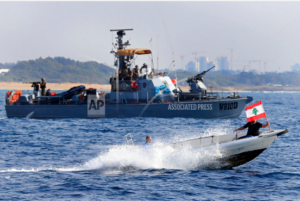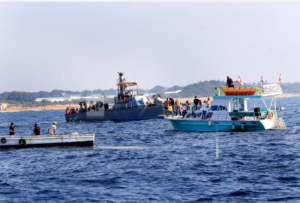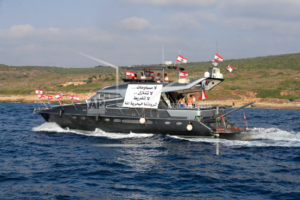With research by CAMERA Arabic.
While BBC Arabic and Al Hurra commendably corrected last week after inaccurately designating all of Israel’s Karish gas field as disputed by Lebanon, Associated Press declines to clarify captions which uncritically parrot Hezbollah talking points falsely portraying the maritime resource as Lebanese. In its one-sided account, only Lebanon’s alleged rights are noted.
The problematic, uncorrected Sept. 4 AP captions refer to “a Lebanese flotilla demanding the cash-strapped country’s right to its oil and gas fields on the Mediterranean Sea, in the southern marine border town of Naqoura, Lebanon. Sunday, Sept. 4, 2022. The protest came days before the mediating U.S. envoy is scheduled to land in Beirut to continue maritime border talks.”
A sampling of the erroneous captions follow:

Lebanese protesters on a motorboat carry their national flag as they sail in front on an Israeli Navy vessel during a demonstration demanding Lebanon’s right to its maritime oil and gas fields, in the southern marine border town of Naqoura, Lebanon, Sunday, Sept. 4, 2022. The protest came days before the mediating U.S. envoy is scheduled to land in Beirut to continue maritime border talks. (AP Photo/Mohammed Zaatari)

Lebanese protesters sail near an Israeli Navy vessel during a demonstration demanding Lebanon’s right to its maritime oil and gas fields, in the southern marine border town of Naqoura, Lebanon, Sunday, Sept. 4, 2022. The protest came days before the mediating U.S. envoy is scheduled to land in Beirut to continue maritime border talks. (AP Photo/Mohammed Zaatari)

Lebanese protesters ride in a yacht with an Arabic banner that reads “No compromises No waivers, No negligence, Our maritime resources belong to us,” during a demonstration demanding Lebanon’s right to its maritime oil and gas fields, in the southern marine border town of Naqoura, Lebanon, Sunday, Sept. 4, 2022. The protest came days before the mediating U.S. envoy is scheduled to land in Beirut to continue maritime border talks. (AP Photo/Mohammed Zaatari)
The Karish gas field, the stinking point in the negotiations involving U.S. envoy Amos Hochstein, is not Lebanese.
In fact, only the northern portion of Karish is in territory claimed by Lebanon as “disputed,” and the rig itself is found entirely in the area both Israel and Lebanon agree is outside Lebanon’s EEZ.
While the captions don’t explicitly mention Karish, the context leaves little doubt that the protesters intend this gas field when they demand “Lebanon’s right to its maritime oil and gas fields.” In fact, that language is straight out of Hezbollah’s talking points about Karish. Indeed, Hezbollah recently threatened Israel after the installment of the Karish rig last month, including with the July 31 video (below) featuring Karish as a target and warning that “playing with time is useless.” As the AP story about this maritime confrontation makes clear (“Lebanon flotilla rallies at Israel sea border ahead of talks“):
The Israeli military in early July shot down three Hezbollah unarmed drones flying over the disputed Karish gas field in the Mediterranean.
Lebanese caretaker Prime Minister Najib Mikati criticized Hezbollah, saying the move could pose risks to the country. Hezbollah leader Hassan Nasrallah in an interview that month said the militant group can locate and strike Karish and any other Israeli gas field.
Both Al Hurra and BBC Arabic recently commendably corrected after making the more minor error that Lebanon claims that the Karish drilling field “is within disputed territorial waters.” (Again, only the northern part of the field lies in water that Lebanon claims as disputed.) AP’s error goes further, not only inaccurately designating Karish as “disputed,” but actually Lebanese.
Separately, AP’s caption inaccurately bizarrely locates the scene “in the southern marine border town of Naqoura, Lebanon.” (Emphasis added.) Obviously, the boats are in the water, not in the town of Naqoura. They are near the Lebanese town of Naqoura, and also near the Israeli town of Rosh Hanikra. But by falsely identifying the location as “in” the Lebanese town of Naqoura, AP bolsters Hezbollah’s narrative of Israel encroaching on Lebanese resources.



